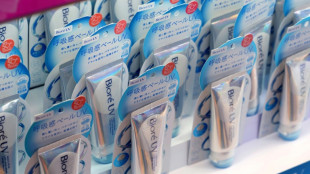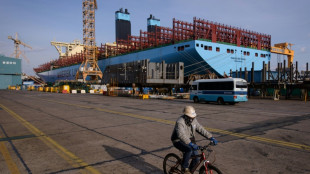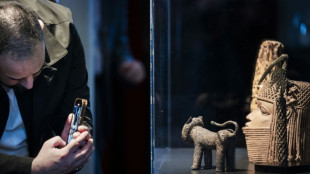-
 Marc Marquez completes perfect Mugello weekend with Italian MotoGP triumph
Marc Marquez completes perfect Mugello weekend with Italian MotoGP triumph
-
Vondrousova warms up for Wimbledon with Berlin title

-
 India still on top in first Test despite Brook fifty for England
India still on top in first Test despite Brook fifty for England
-
Ukraine army chief vows to expand strikes on Russia

-
 United behind Iran war effort, Israelis express relief at US bombing
United behind Iran war effort, Israelis express relief at US bombing
-
Former England fast bowler David Lawrence dead at 61

-
 At least three impacts in Israel during Iran missile attacks, 23 hurt
At least three impacts in Israel during Iran missile attacks, 23 hurt
-
Trump says US strikes 'obliterated' Iran nuclear sites

-
 Japan's high-tech sunscreens tap into skincare craze
Japan's high-tech sunscreens tap into skincare craze
-
Tesla expected to launch long-discussed robotaxi service

-
 South Korea counts on shipbuilding to ease US tariff woes
South Korea counts on shipbuilding to ease US tariff woes
-
Bombing Iran, Trump gambles on force over diplomacy

-
 Trump says US attack 'obliterated' Iran nuclear sites
Trump says US attack 'obliterated' Iran nuclear sites
-
Itoje to Valetini: five to watch when the Lions face Australia

-
 Wallabies confident but wary of wounded British and irish Lions
Wallabies confident but wary of wounded British and irish Lions
-
Utopia and fragile democracy at Art Basel fair

-
 Freed Israeli hostage recounts 484-day nightmare in Gaza
Freed Israeli hostage recounts 484-day nightmare in Gaza
-
River Plate frustrated by Monterrey in 0-0 stalemate

-
 Panama cuts internet, cell phones in restive province
Panama cuts internet, cell phones in restive province
-
Tens of thousands join pro-Palestinian marches across Europe

-
 Coach Penney unsure of return to Super Rugby champions Crusaders
Coach Penney unsure of return to Super Rugby champions Crusaders
-
Trump says US 'obliterated' Iran nuclear sites, threatens more

-
 Olympic chief Kirsty Coventry's steeliness honed by hard knocks
Olympic chief Kirsty Coventry's steeliness honed by hard knocks
-
Outgoing IOC president Thomas Bach faced mammoth challenges

-
 Maro Itoje comes of age with Lions captaincy
Maro Itoje comes of age with Lions captaincy
-
Trump says US bombs Iran nuclear sites, joining Israeli campaign

-
 In New York, Vermeer show reveals art of the love letter
In New York, Vermeer show reveals art of the love letter
-
Ex-members of secret US abortion group fear return to dark era

-
 Trump says US launched 'very successful' attack on Iran nuclear sites
Trump says US launched 'very successful' attack on Iran nuclear sites
-
Man City squad must be trimmed: Guardiola

-
 Minjee Lee grabs four-shot lead at 'brutal' Women's PGA Championship
Minjee Lee grabs four-shot lead at 'brutal' Women's PGA Championship
-
Olympic balloon rises again in Paris

-
 Inter Milan, Dortmund claim first wins at Club World Cup
Inter Milan, Dortmund claim first wins at Club World Cup
-
South American teams lay down the gauntlet to Europe at Club World Cup

-
 Fleetwood grabs PGA Travelers lead as top-ranked stars fade
Fleetwood grabs PGA Travelers lead as top-ranked stars fade
-
'Lucky' Lamothe hat-trick guides Bordeaux-Begles into Top 14 final

-
 Lamothe hat-trick guides Bordeaux-Begles into Top 14 final
Lamothe hat-trick guides Bordeaux-Begles into Top 14 final
-
UK PM Starmer says Kneecap should not perform Glastonbury

-
 Inter Milan strike late to beat Urawa Reds at Club World Cup
Inter Milan strike late to beat Urawa Reds at Club World Cup
-
Dortmund stars hide from sun at Club World Cup 'sauna'

-
 One game to win it all: Thunder host Pacers in NBA Finals game 7
One game to win it all: Thunder host Pacers in NBA Finals game 7
-
Russell says he's buried Sexton hatchet as old rivals united in quest for Lions glory

-
 Nigeria receives over 100 looted artifacts from the Netherlands
Nigeria receives over 100 looted artifacts from the Netherlands
-
I. Coast president Ouattara tapped to run for fourth term

-
 Protesters slam war profiteering, Israel at French air fair
Protesters slam war profiteering, Israel at French air fair
-
Belarus frees jailed opposition leader after appeal from US

-
 Medvedev dispatches home hope Zverev to meet Bublik in Halle final
Medvedev dispatches home hope Zverev to meet Bublik in Halle final
-
Nigeria receives over 100 looted artifacts from Netherlands

-
 Hundred hero Pope answers England's prayers as Bumrah strikes in first Test
Hundred hero Pope answers England's prayers as Bumrah strikes in first Test
-
Bellingham strikes as Dortmund sink Sundowns in Club World Cup thriller

Malaysia's Silicon Valley ambitions face tough challenges
Malaysia is making great strides in its effort to become a major player in the global semiconductor industry as it looks to capitalise on a surge in demand driven by the AI explosion but analysts warn it faces headwinds.
Malaysia's signing of a major deal with British chip giant Arm this month was the latest step towards achieving the country's goal of producing its own top-end chips in the next five to seven years.
But experts say internal constraints such as a talent crunch, funding problems and other supply chain gaps are key hurdles the country must overcome if it is to compete with top regional industry giants such as Taiwan, South Korea and Japan.
Shafiq Kadir, an equity analyst at CGS International, said local integrated circuit (IC) design houses had narrow access to large capital, and lacked a strong track record and an established pool of experienced engineers.
"We still lack sufficient talent, as our tertiary education is less prepared in producing graduates with the right skill set," Shafiq told AFP.
Malaysia Semiconductor Industry Association president Wong Siew Hai also said there was a "shortage of those suitable for the specific experience and skill sets that we are looking for".
Although there are experienced Malaysians who have worked with multinational firms, many of them chose to work abroad for better pay and opportunities, among other factors, Wong said.
"We lose an average 15 percent of our talent in the semiconductor industry every year to brain drain," he told AFP.
In the deal signed on March 5, Malaysia will pay Softbank-owned Arm $250 million over a decade to access its intellectual property, including seven high-end chip design blueprints and other technology.
The aim is to help Malaysia move into more value-added production such as wafer fabrication and IC design.
The deal also includes the training of 10,000 local semiconductor engineers, while Arm will establish its first office in Southeast Asia in Kuala Lumpur.
- 'White elephants' -
Farlina Said, a cyber and technology policy fellow at the Institute of Strategic and International Studies Malaysia, said building semiconductor ecosystems would require time and careful planning.
"These would have to be mapped against resource availability and market conditions. Building the infrastructure without sufficient players can create white elephants for the industry," she told AFP.
"Moving up the value chain means first, Malaysia has to find means of transferring knowledge to develop local capacities.
"Second, funds are needed to develop the ecosystem surrounding the knowledge transfer. This includes technology transfers, talent pipelines and R&D sustainability," she added.
Wong, the industry group chief, said the government's $5.3-billion allocation over the next decade to upscale Malaysia's semiconductor sector is small compared with state investments by China and the United States.
Shafiq, the analyst, said the tools and equipment required for chip production could run into the billions of dollars -- apart from the need for highly skilled engineers and operators.
"Achieving a certain level of production yield on those high-end chips... has proven to be very challenging even for established fabs like Samsung and Intel," he said.
- 2030 sales target -
Expert Farlina said competing with semiconductor powerhouses in the region will not be a walk in the park as they have "developed the ecosystems to support technological leadership in the past few decades".
Malaysia, however, is not starting from scratch, the analysts said.
The country has long been a key player in the chips sector, with its northern state of Penang -- often called the nation's Silicon Valley -- at the heart of its success, although focused on the back end of the industry such as assembly and testing.
"Key (multinational corporations) such as Intel and AMD both have integrated circuit design operations in Penang... and this has somewhat generated the development of IC design among local engineers for decades," Shafiq said.
"We stand to benefit from this as more capital and focus are being put into the IC design area."
Malaysia accounts for an estimated 13 percent of global back-end manufacturing, according to German tech firm Bosch.
And Malaysia's semiconductor exports were valued at 387.98 billion ringgit ($87.48 billion) in 2024, the Malaysia External Trade Development Corporation said, making the country one of the world's top 10 chip exporters.
The industry association is aiming for the country's chip exports to reach $270 billion by 2030, which Wong said would allow the country to "maintain its relative position in the world" as a top semiconductor exporter.
X.AbuJaber--SF-PST


